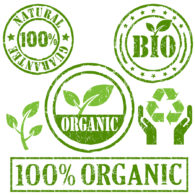Healthy Living: is Organic and Natural Food Worth It?
This weeks theme: Going organic on a budget. In this tough economy I will explore ways to go organic and still have money left over.
Is Organic Worth It?
Been in the grocery store recently shopping for meats, eggs, fish milk etc? Noticed all the strange labeling; “Organic” or “Natural” on these items? So we all know these organic food stuffs cost significantly more than regular food, but why, what is the difference really and is it worth the extra cost?
The word natural is used for most fruits and veggies, and is mostly a marketing ploy to get you to buy their product, as all fruits and veggies are natural – unless its some newly developed processed food, it is natural. What you should be looking for is the food labeled “organic”.
So what does organic mean?
Organic food is food which has been grown without the use of pesticides, fertilizers or other chemicals. Buying organic food has two major benefits: Firstly you are preventing these potentially harmful chemicals from entering into the environment, so organic food is more environmentally friendly. Secondly, you do not induce these chemicals yourself, which is a lot healthier than “regular” foods. Since organic food tends to be a bit more expensive; if you are shopping on a budget then skip over the organic fruits and veggies which have peels that you remove before you eat them e.g. Bananas, Oranges etc… After all once you have removed the peel you remove the chemicals. Opt to at least buy organic foods such as apples where you actually consume the peel.
Remember to rinse the food thoroughly under water when you get home, regardless of whether it is organic or not.
Another label that you might come across is “No Hormones”, this is generally used on milk and meat products. Technically all such labels are completely wrong, as all animals produce hormones to function properly. What they really mean with this label is that no artificial hormones were given to the animal to grow faster and fatter or to produce more milk. Regardless of hormones or not, this meat and milk is perfectly safe for human consumption.
The last label that you might come across while shopping is found on meat and egg products. These will indicate whether the animal was caged or penned. This makes no difference to the nutritional value of the food but is more a question of animal rights. These products also generally cost more but are more of a humane decision.
So remember to read the labels carefully while grocery shopping, as being informed about what they mean can help you make the best choices for your diet.
By Janet Schlarbaum. At Jai Yes Foods, we believe we’re helping consumers reconsider their outlook towards eating organically and locally.
